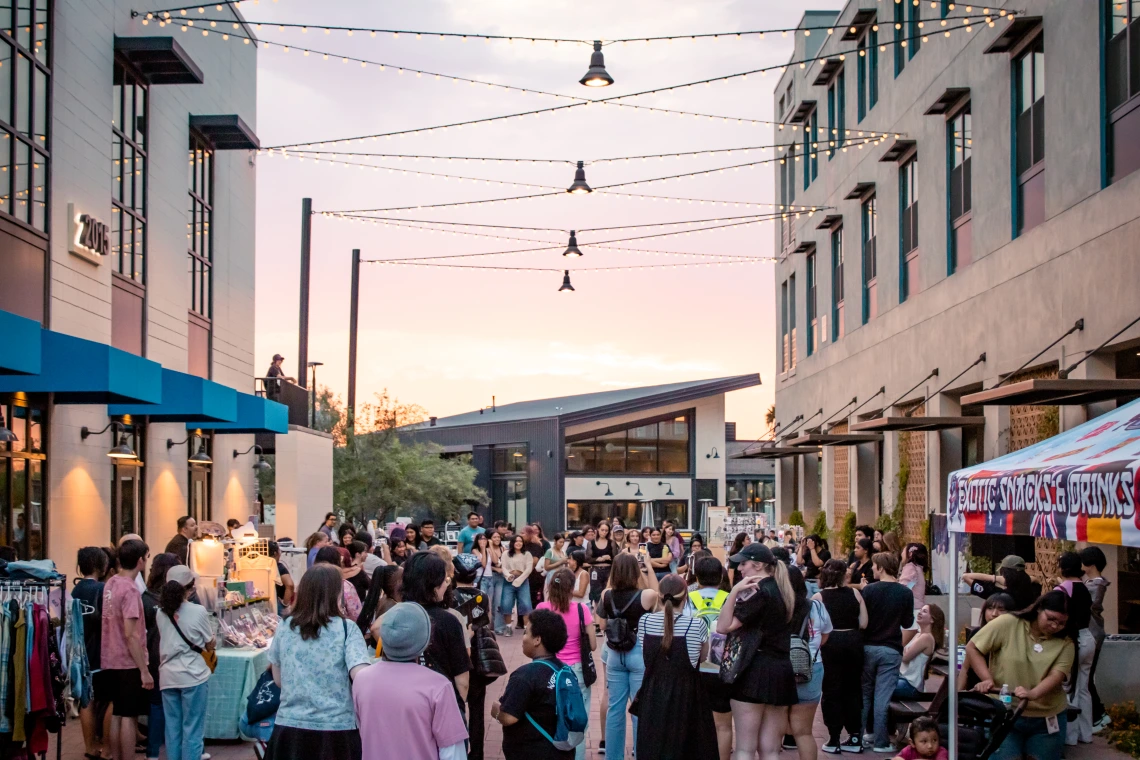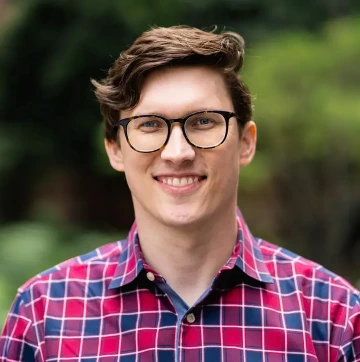From Franke Honors to Urban Innovation: Alumni Ryan Johnson’s Mission to Reinvent the Way We Live

Instead of empty parking lots, residents of Culdesac enjoy weekly events, such as this bustling night market.
We recently caught up with Franke Honors alumnus Ryan Johnson, CEO and Co-Founder of Culdesac, a car-free neighborhood developer, whose 20-year career spans Opendoor, the MTA, Bain Capital, and global urban planning.

Tell us about yourself (you can talk a bit about your personal, educational, and professional background)
I’m the CEO and Co-founder of Culdesac Inc., where we build and manage walkable neighborhoods. Our focus is on creating communities that embrace a culture of belonging, transportation freedom, and thriving local businesses.
Before Culdesac, I graduated from the University of Arizona with BAs in Economics and International Studies and was honored to be recognized as the Outstanding Honors Senior. I turned down MIT to accept the Flinn Scholarship, which allowed me to attend UA. While at UA, I used that scholarship money to start a real estate business. I learned the industry from scratch, put in the sweat equity, and eventually built a portfolio of 60 bedrooms. That experience sparked my long-term interest in real estate and entrepreneurship.
I also received the Fulbright Scholarship while at UA, which gave me the opportunity to spend a year in Brazil studying the transportation system there. I later worked on transportation and urban planning with McKinsey, the New York Metropolitan Transportation Authority, and Bain Capital Private Equity.
Then I joined the founding team of Opendoor, a real estate technology company that provides homeowners with competitive cash offers. Today, Opendoor operates in 42 markets and has served more than 100,000 customers.
Now I’m merging my experience in both real estate and transportation at Culdesac, building the next generation of walkable neighborhoods in the U.S.
As an entrepreneur, what are you most passionate about in your work as the CEO and Co-Founder of Culdesac? What inspired you to create walkable communities? What are some of your biggest rewards, and challenges?
I’m most passionate about building places that bring people and cities together. The inspiration for Culdesac started with my first trip to Europe. I grew up in the suburbs of Phoenix, driving an SUV, and hadn’t spent much time outside the U.S. But when I visited Budapest, I was struck by the energy of the walkable neighborhoods, the access to transit, thriving local businesses, and a strong sense of community. Later, I traveled to more than 60 countries and lived in a handful, drawing inspiration from pieces of each place. Those experiences gave me a vision for what walkable neighborhoods could look like in the U.S.
The conviction came later, when I realized how deeply Americans want this lifestyle. Every generation shows a willingness to pay more to live in walkable neighborhoods, including 92% of Gen Z and 69% of Baby Boomers. The places we built before cars still outperform newer, car-dependent areas today. And with new transportation options like e-bikes, ridehail, and even autonomous vehicles, we now have the opportunity to bring back walkable neighborhoods in the U.S. That became Culdesac’s mission–to bring housing and transportation together to build the next generation of walkable neighborhoods and make it possible to share this walkable lifestyle for all of the U.S.
The biggest reward has been seeing Culdesac Tempe come to life. Watching neighbors connect, local businesses thrive, and the community grow has been a powerful reminder of why we started this journey in the first place.
The biggest challenge was starting this journey seven years ago, when we got laughed out of the room. People said it couldn’t happen, especially not in the heat of Phoenix, without cars, and without zoning changes. Today, real estate leaders across the country are pointing to Culdesac Tempe as proof that it can work. What once seemed impossible is now setting a precedent for how cities across the U.S. can build for walkability.
Ryan, you graduated with Honors with a BA in interdisciplinary studies in 2006. What advice would you give to current students embarking on their educational journeys?
If there are two books I’d suggest anyone read, they are:
How to Win Friends and Influence People by Dale Carnegie, and
Be So Good They Can’t Ignore You by Cal Newport
The first is timeless, and the takeaway is that EQ is just as important as IQ. When you go to college, you’ve come from a pure IQ world. You’ve had schedules for everything, and tests told you how well you did on everything. College is more unstructured, and the working world even more still. EQ teaches you how to understand yourself and others. How you work alone, with more senior people, with more junior people, and with colleagues on your level will determine your career more than just how smart you are. And you can learn to be better at it.
The second is the book I wish had existed when I started college. It has two parts. At first, it destroys the passion hypothesis, making the case that passion isn’t the starting point. Instead, developing rare and valuable skills leads to impact, and impact, in turn, creates passion and opportunity. That has been true in my own life. The skills I gained at Arizona, both in the classroom through my economics and international studies degree, and outside of it through that early real estate business, set me on the path to where I am today. Those skills in real estate and, later, transportation have allowed me to build Culdesac Tempe, something I’m truly passionate about.
In what ways has your Franke Honors experience had an impact on your career path and who you are today? Who or what inspired you most?
The mentors I met at UA through the honors college had profound impacts on my life. One became a coauthor for an economics paper on transportation that opened numerous doors for me. Another pushed me to live and study abroad to understand the world. Lessons from those trips became foundational insights that I’ve put into use at Culdesac. I also met lifelong friends and collaborators.
During your time in Franke Honors, did you receive a scholarship and if so, what ways did receiving a scholarship impact your life?
I turned down MIT to attend UA for a couple of reasons, one of which is scholarships. Between the Flinn and the National Merit Scholarship, it was about a full ride plus $50k on top. That capital proved to be enormously valuable because I used it as the seed capital to build a real estate business starting freshman year. By the time I graduated, I had a 60-bedroom portfolio of homes, and the lessons I learned laid the foundation for future businesses.
One scholarship I received while at UA was the Fulbright. That paid for a year studying the transportation system in Brazil.
There are many ways for alumni to give back. What forms of engagement do you look for or find most valuable?
Hiring and training the next generation of talent has been a way I’ve stayed connected with the university. For me, hiring rising stars from UA has been a source of talent that has filled many important roles over the years. I also find it fulfilling to watch people reach their potential, which sometimes they didn’t even know they had.
As a proud UAZ Honors Alumni, what were some of your favorite college memories?
I have nostalgia for so much of my college experience. But it’s the people that I remember most fondly. Meeting future best friends, business partners, and collaborators.
Any final words of wisdom for current Franke Honors students, or young alumni who are just starting in their careers?
A final piece of advice I’d share is the importance of following up. Whether it’s with people you meet, opportunities you pursue, or projects you start, consistent follow-up is a skill that sets young professionals apart. It shows commitment, builds trust, and often creates opportunities you wouldn’t expect.

